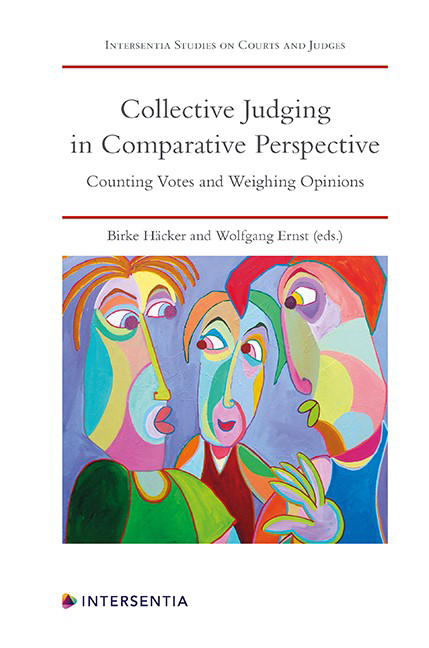Book contents
- Frontmatter
- Preface
- Contents
- List of Cases
- List of Contributors
- PART I DESIGNING COLLEGIATE COURTS’DECISION-MAKING PROCESSES
- PART II COLLEGIATE COURTS IN THE COMMON LAW TRADITION
- PART III COLLEGIATE COURTS IN THE EUROPEAN CIVIL LAW TRADITION
- PART IV COLLEGIATE COURTS IN A NON-EUROPEAN CIVIL LAW JURISDICTION: THE CASE OF JAPAN
- PART V SUPRANATIONAL AND INTERNATIONAL COLLEGIATE COURTS
- PART VI VOICES FROM THE AUDIENCE AND CLOSING REMARKS
- About the Editors
Chapter 3 - Collective Judging in the Court of Appeal of England and Wales
Published online by Cambridge University Press: 09 February 2021
- Frontmatter
- Preface
- Contents
- List of Cases
- List of Contributors
- PART I DESIGNING COLLEGIATE COURTS’DECISION-MAKING PROCESSES
- PART II COLLEGIATE COURTS IN THE COMMON LAW TRADITION
- PART III COLLEGIATE COURTS IN THE EUROPEAN CIVIL LAW TRADITION
- PART IV COLLEGIATE COURTS IN A NON-EUROPEAN CIVIL LAW JURISDICTION: THE CASE OF JAPAN
- PART V SUPRANATIONAL AND INTERNATIONAL COLLEGIATE COURTS
- PART VI VOICES FROM THE AUDIENCE AND CLOSING REMARKS
- About the Editors
Summary
INTRODUCTION
The Court of Appeal of England and Wales consists of 38 Lord and Lady Justices of Appeal (‘LJs‘) as well as the Lord Chief Justice, the Master of the Rolls, the President of the Queen‘s Bench Division, the President of the Family Division, and the Chancellor of the High Court. The Master of the Rolls is the President of the Court, and one of the members of the Court holds the office of Vice- President. Since 2007, one member of the Court has held the office of Senior President of Tribunals. The three words which characterise its work are ‘flexibility‘, ‘informality‘, and ‘collegiality‘. Each has advantages and disadvantages. In our experience, collegiality is generally present even when there are sharp differences which cannot be resolved. It is achieved in a similar way to that described by Judge Harry T Edwards in the US Court of Appeals for the DC Circuit, but without rules and with few guidelines.
The majority of the members of the Court of Appeal sit in two appellate jurisdictions, the Court of Appeal Civil Division and the Court of Appeal Criminal Division. The Lord Chief Justice has overall responsibility for the entire Court and sits in both Divisions, but is primarily the head of the Criminal Division. The head of the Civil Division is the Master of the Rolls. Members of the Court also sit in a third jurisdiction, the Divisional Court, which hears important judicial reviews and public law cases, such as the first Miller case concerning article 50 of the Treaty on European Union, and challenges to and statutory appeals from the decisions of inferior courts, including appeals in extradition and professional discipline cases.
Some LJs do not sit in crime; and some sit predominantly in crime. All LJs are assisted by a ‘clerk‘ for administrative but not legal work, and most have a Judicial Assistant, a young lawyer who prepares bench memos on a case, sorts out the papers in cases where what the parties have presented is not well arranged (perhaps because they are unrepresented lay people), and researches particular questions on which we consider the skeleton arguments are unclear, unsatisfactory, or incomplete. They provide valuable assistance, but our impression is that at present their role and contribution is very different to that of a judicial clerk in United States Federal courts.
- Type
- Chapter
- Information
- Collective Judging in Comparative PerspectiveCounting Votes and Weighing Opinions, pp. 37 - 46Publisher: IntersentiaPrint publication year: 2020



